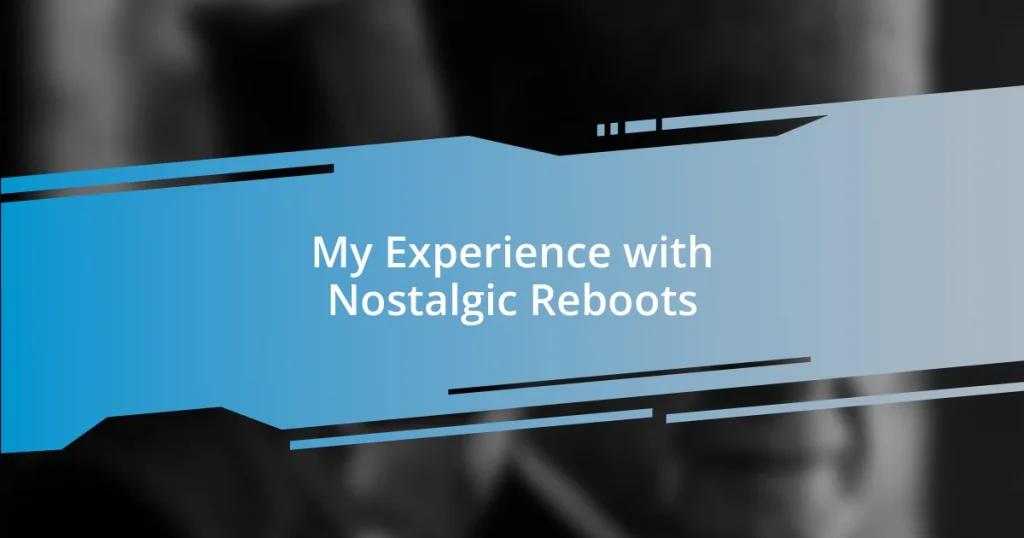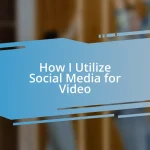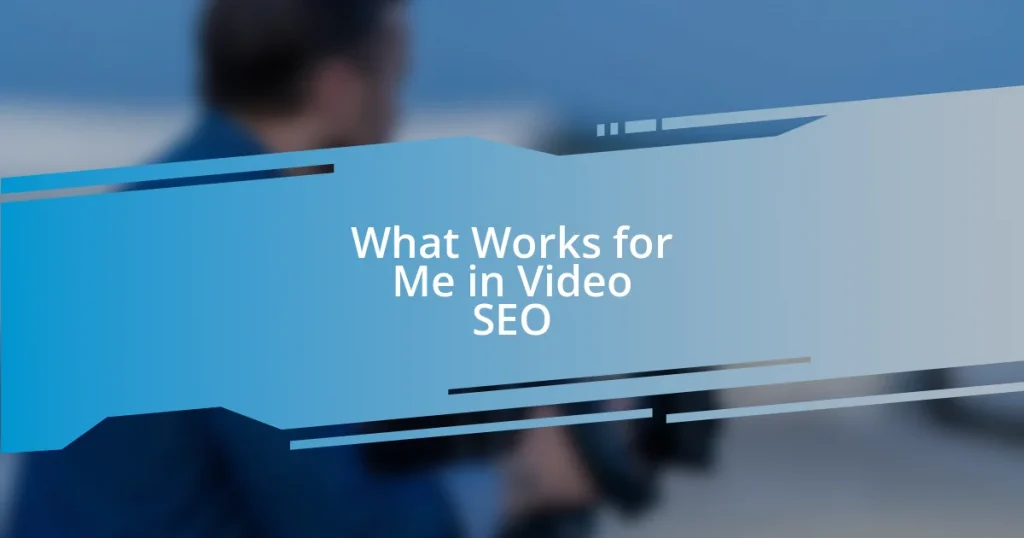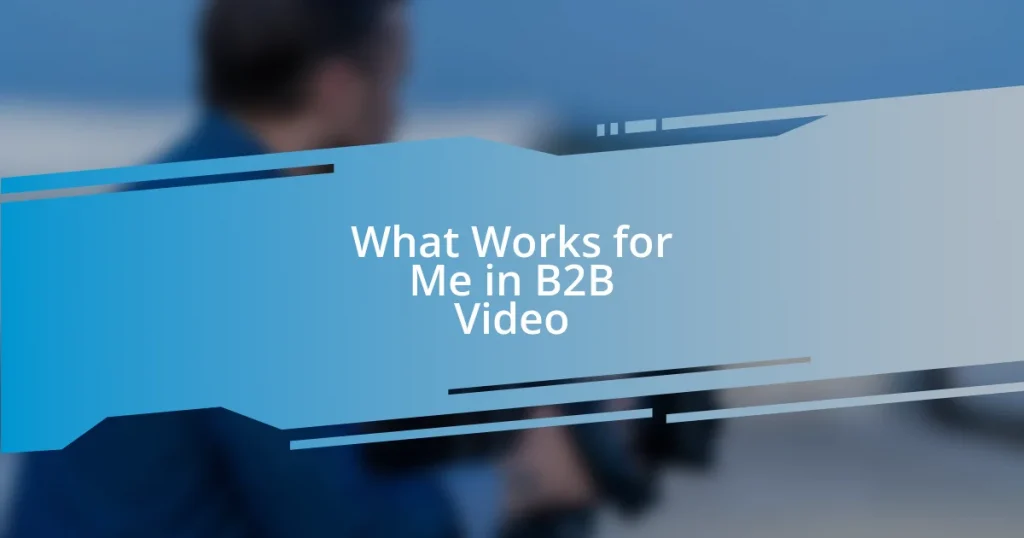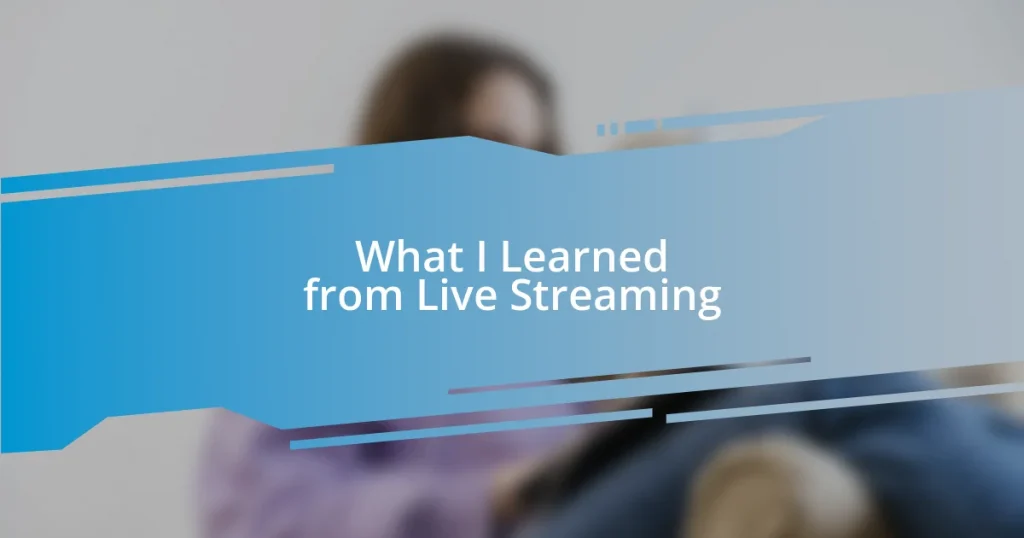Key takeaways:
- Nostalgic reboots evoke emotional comfort and create connections between generations, often blending beloved stories with modern themes.
- These reboots can reshape perceptions of original narratives, allowing for exploration of contemporary issues and fostering meaningful discussions.
- The future of nostalgic reboots is poised to prioritize diversity and relevance, expanding storytelling while respecting original cultural impacts.
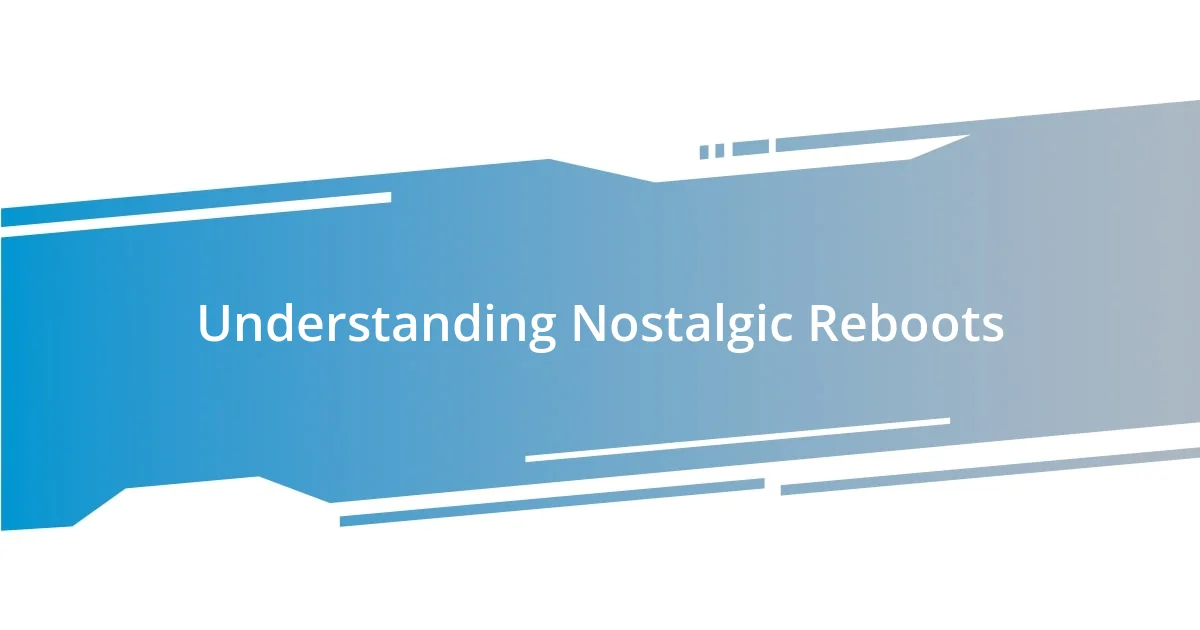
Understanding Nostalgic Reboots
Nostalgic reboots tap into our fondest memories, often resurrecting beloved characters and stories from our past. I remember when “The X-Files” returned; it felt like revisiting an old friend that had been away for years. Did you ever wonder why these familiar stories resonate so deeply with us? I think it’s the comfort of nostalgia—an emotional connection that transports us back to simpler times.
When a favorite show or movie is rebooted, it often ignites a bittersweet blend of excitement and apprehension. Take “Fuller House” as an example; I felt a wave of joy at seeing the Tanner family again, but there was also a nagging fear that it wouldn’t live up to the original. Can you relate? I sometimes question whether new interpretations honor the essence of what made the originals special, or if they simply exploit our nostalgia for a quick buck.
The allure of nostalgic reboots lies in their ability to blend the past with the present, creating something fresh while leaning on the foundation we cherish. I find it fascinating how these projects often introduce modern themes and diverse characters, challenging the narratives we grew up with. Does this generation’s version of our childhood stories make them more relevant today? As I reflect on this evolution, I can’t help but appreciate how it gives us all a chance to engage in conversations about growth, identity, and the passage of time.
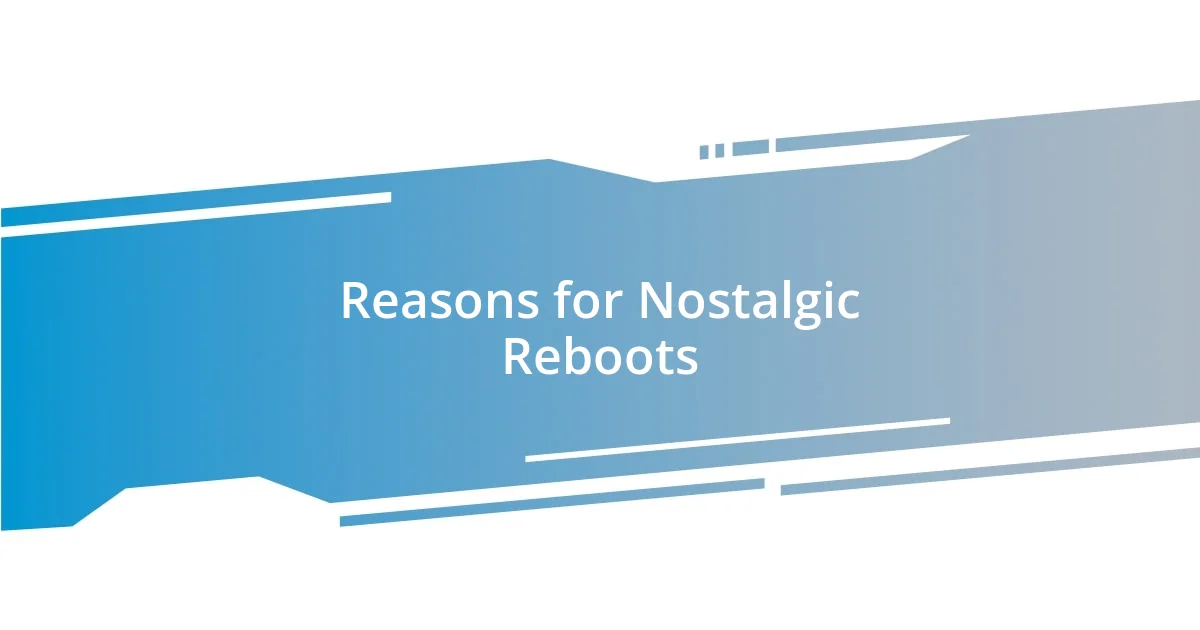
Reasons for Nostalgic Reboots
One of the driving forces behind nostalgic reboots is the deep emotional connection they create with audiences. I recall the thrill of seeing “Ghostbusters” return; it not only brought back my childhood excitement but also offered a chance to relive those unforgettable moments with friends. It’s incredible how these reboots often form a bridge between generations, allowing parents to share beloved stories with their children. Here are some key reasons for their popularity:
- Emotional Comfort: Familiar characters and stories evoke warmth and comfort from our past.
- Cultural Relevance: Nostalgic reboots can reflect current societal values while maintaining the essence of the original.
- Economic Incentive: Studios recognize the built-in audience that nostalgic reboots attract, making them a safe financial bet.
Additionally, the wave of nostalgia appeals to our collective memory, often rekindling feelings we might have thought were lost. When I watched “The Wonder Years” reboot, it felt like a homecoming, awakening old memories of life’s simpler joys. It’s fascinating to think about how these stories can both celebrate and critique the past, prompting us to reflect on our own growth. Here’s why these reboots resonate on such a profound level:
- Sense of Belonging: They create a communal experience as fans engage in shared nostalgia.
- Exploration of Legacy: Reboots allow us to explore how original narratives can evolve and stay relevant.
- Familiarity with a Twist: They often reimagine classic premises through modern lenses, making them fresh yet recognizable.
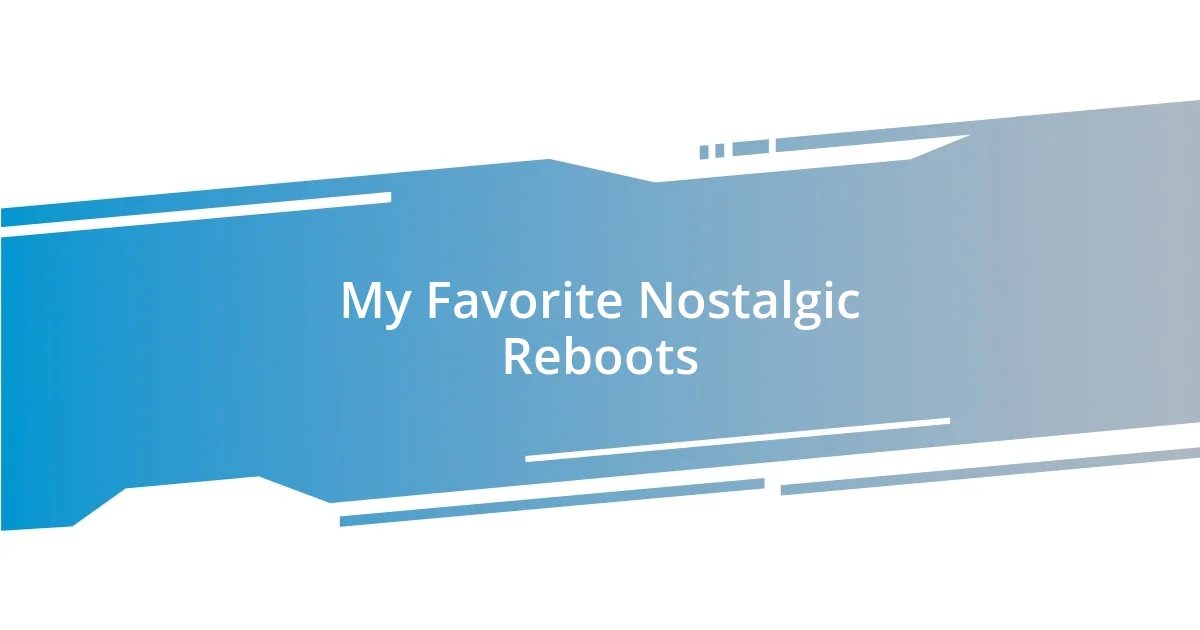
My Favorite Nostalgic Reboots
When I think about my favorite nostalgic reboots, “Stranger Things” immediately comes to mind. It beautifully weaves together the essence of 80s science fiction and horror while introducing new characters that feel just as relatable. That mix of nostalgia and fresh storytelling sparked a wave of excitement in me, reminding me of nights spent watching classic films with my friends, trying to scare each other with ghost stories. The way this series pays homage to the past, yet boldly charts its own course, is something I deeply admire.
Another reboot that stands out for me is “DuckTales.” I grew up watching the original cartoon, so the updated version felt like a love letter to my childhood. The characters are revamped with modern sensibilities while still keeping their charm intact. Watching episodes with my own kids not only rekindled my fond memories but also allowed me to share those precious moments with them. Isn’t it incredible when a reboot can bridge that generational divide?
Lastly, I have to mention “Mary Poppins Returns.” This was a delightful surprise that brought Mary Poppins back to life in a vibrant and contemporary way. I still remember the joy of watching the original with my family, singing along to the catchy tunes. To see the beloved character return and inspire new adventures was a heartwarming experience that filled me with joy. It made me realize how timeless these stories are; they can evolve yet still capture the magic that made them special in the first place.
| Reboot | Highlights |
|---|---|
| Stranger Things | Blends 80s nostalgia with fresh storytelling, relatable characters. |
| DuckTales | Modern updates of classic characters while retaining their charm; family-friendly fun. |
| Mary Poppins Returns | Heartwarming revival that bridges old and new, filled with magic and music. |
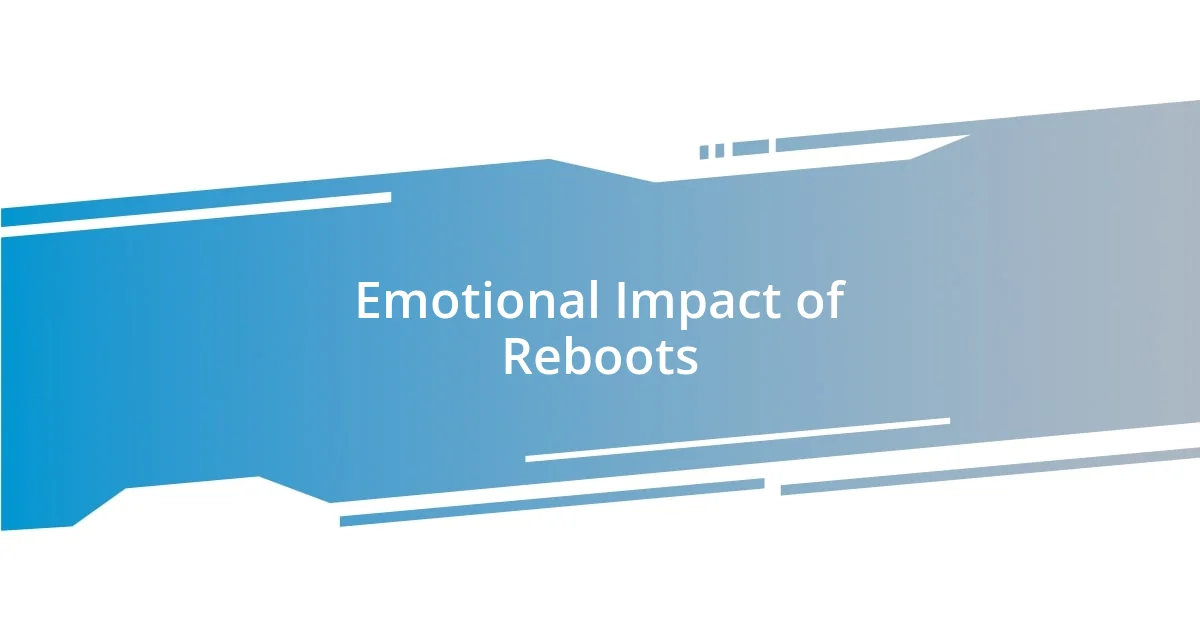
Emotional Impact of Reboots
Some of my most profound memories are intertwined with the reboots I’ve experienced. For instance, when I watched the latest iteration of “The Fresh Prince of Bel-Air,” I couldn’t shake the feelings of laughter and nostalgia from the original series. It struck me how the new take added layers of depth to the characters while still honoring the light-heartedness of the original. How remarkable it is that these stories can evolve yet still evoke the same laughter and connection?
Reboots often carry an emotional weight that feels personal. I vividly remember the release of “Fuller House,” and it was as if I was transported back to my living room as a child, laughing alongside the Tanner family. There’s something powerful about seeing characters navigate new challenges while still embodying the traits that made us fall in love with them in the first place. It raised a question for me: How do these familiar faces remind us of our own life journeys, hopes, and dreams?
It’s fascinating to notice how these reboots can elicit a range of emotions, from joy to poignant reflection. Watching “The Lion King” reboot brought tears to my eyes—not just from nostalgia, but from seeing how themes of family and heritage resonate with today’s audiences. It’s a reminder of how timeless storytelling can touch multiple generations, isn’t it? As I sit with my family, sharing in these moments, I feel a sense of continuity, bridging my past with the present and sharing it with my own children.
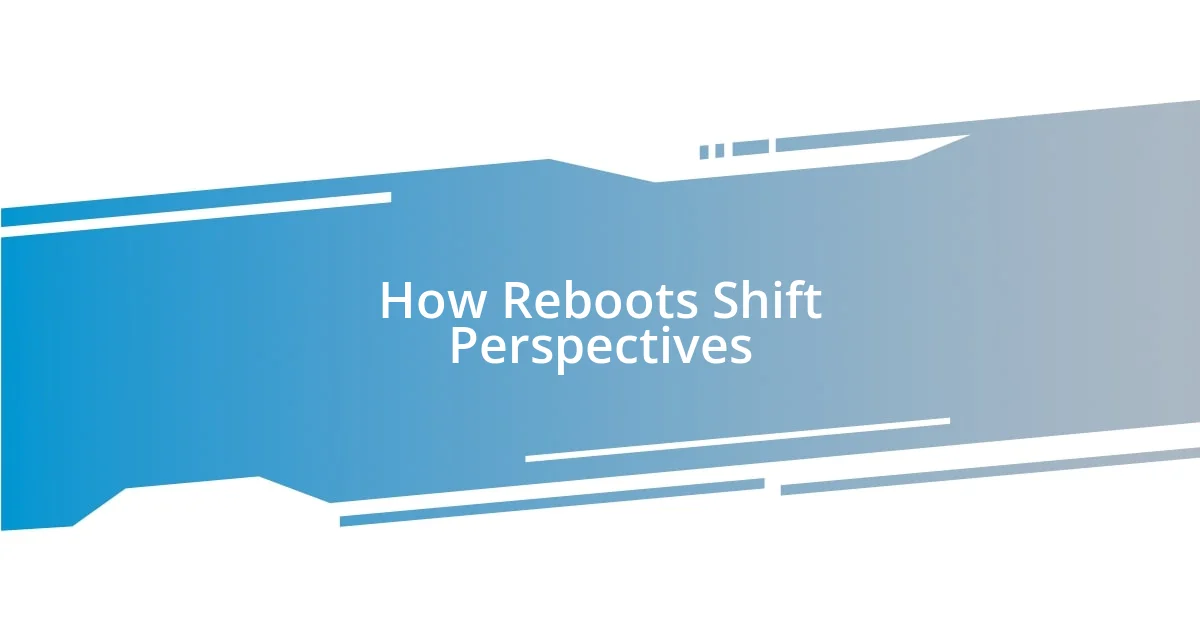
How Reboots Shift Perspectives
Reboots have a unique way of reshaping how we perceive classic narratives. I remember when I watched the reimagined “Ghostbusters.” Initially, I was skeptical about the new cast taking on an iconic franchise, but I found myself appreciating how it flipped traditional roles and introduced fresh humor. This experience prompted me to ponder: can a reboot actually broaden our understanding of the original themes by offering a different perspective?
As I reflected on “The Twilight Zone,” I realized that its modern renditions breathe new life into longstanding societal issues. In its latest reboot, I noticed how the storytelling cleverly tackles contemporary fears while honoring the suspenseful essence of the original. It made me think about how revisiting the same ideas through a new lens can spark conversations about the evolution of our values over time—aren’t we all navigating these complex changes together?
What fascinates me most is seeing how reboots encourage us to connect with different generations. Watching “The Muppet Show” revival with my elderly neighbor, who grew up with the originals, brought us closer. We laughed at missed jokes and shared stories stemming from the cultural context of those times, reminding me of our shared journey through pop culture. It’s intriguing how reboots not only rekindle childhood memories but also create opportunities for intergenerational dialogue—how often do we engage in such heartwarming connections nowadays?
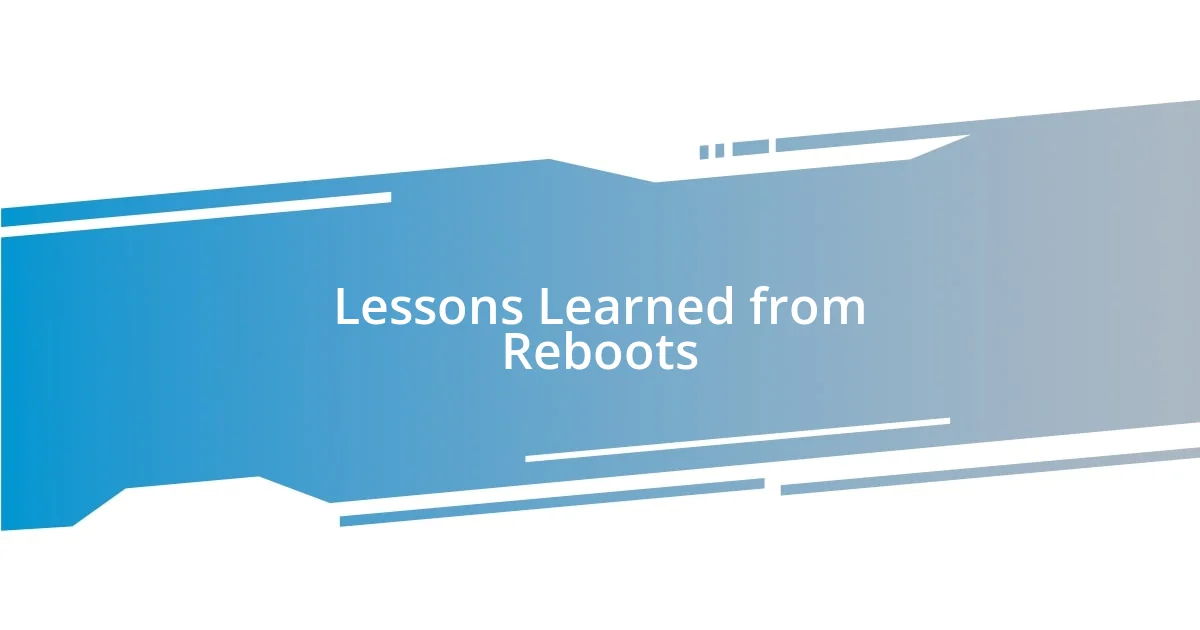
Lessons Learned from Reboots
Reboots teach us about the importance of re-exploring narratives to meet contemporary audiences. I recall watching the reboot of “Charmed” and initially feeling a twinge of disappointment. However, as I followed the new trio of sisters, I found their modern struggles resonating more deeply with the current societal climate than their predecessors ever did. Isn’t it fascinating how the core of such stories can remain the same, yet the context can shift dramatically?
There’s also a lesson in the importance of thoughtful adaptation. When I first encountered the new “Anne with an E,” it wasn’t just nostalgia that drew me in; it was the way it expanded Anne’s story to address issues like mental health and feminism. This depth made me reevaluate my earlier understanding of the character and her world. It raises a compelling question: can modern reboots challenge our perceptions and instigate meaningful discussions that the originals might not have addressed?
Watching reboots alongside friends or family can foster a sense of community and shared experience. I remember a movie night featuring the reboot of “Jurassic World.” The awe and excitement we all felt reminded me of seeing the original trilogy in theaters as a kid—those moments cemented our bond. How powerful it is that these familiar stories can create new memories and conversations, renewing our collective experiences while honoring those that shaped us?
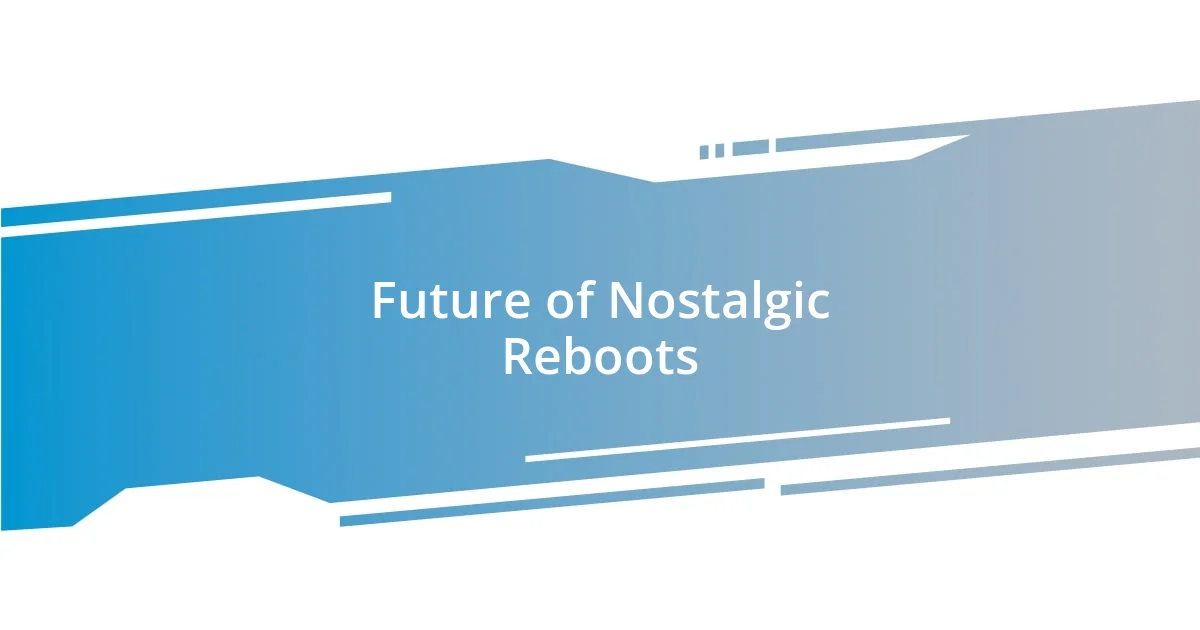
Future of Nostalgic Reboots
The future of nostalgic reboots really excites me, as I see them branching into more diverse storytelling. Take the upcoming “The Fresh Prince of Bel-Air” reboot; I was intrigued by the idea of transforming a light-hearted sitcom into a more dramatic exploration of family and identity. Wouldn’t it be interesting if this shift could lead to deeper conversations about race and privilege that resonate with today’s audiences?
As I reflect on my own experiences, I sense a growing appetite for reboots that not only tap into nostalgia but also serve as platforms for change. For instance, seeing “Lizzie McGuire” take a hiatus because they wanted to ensure the storyline respected the character’s growth left me hopeful. How often do we interrupt childhood favorites to explore the complexities of adult life? It’s a compelling approach that can inspire many creators to reflect on the cultural impact of the originals while also pushing boundaries.
Moreover, I can’t help but wonder about the role of technology in shaping these new narratives. With the rise of streaming platforms, we can access more content and voices than ever before. I think about how shows like “Animaniacs” returned, not just to entertain but to engage with contemporary issues, reminding me of the responsibility creators now hold. Isn’t it thrilling to think that the future of nostalgic reboots could prioritize not just entertainment but relevance to the current societal landscape?











